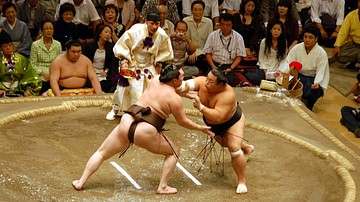Search
Did you mean: Wall?
Search Results

Definition
Kingdom of Benin
The Kingdom of Benin, located in the southern forests of West Africa (modern Nigeria) and formed by the Edo people, flourished from the 13th to 19th century CE. The capital, also called Benin, was the hub of a trade network exclusively controlled...

Definition
Meiji Period
The Meiji period refers to the period in Japanese history from 1868 to 1912 during which the Meiji Emperor reigned. Following the overthrow of the Tokugawa shogunate in the Meiji Restoration of 1868, Japan's new leaders embarked on a program...

Definition
Sumo - Japan's Ancient Form of Wrestling
Sumo (Ozumo) is an ancient form of wrestling which has long been the national sport of Japan. Its origins go back to the Yayoi period (c. 300 BCE - c. 300 CE) and it incorporates many elements of the Shinto religion in its various rituals...

Definition
Portuguese Angola
Portuguese Angola in southwest Africa was the first European colony on that continent. While settlement from 1571 proved problematic in the interior, the Portuguese did obtain a large number of slaves which they shipped to their Atlantic...

Definition
Great Fear
The Great Fear (French: la Grande Peur) was a wave of panic that swept the French countryside in late July and early August 1789. Fearful of plots by aristocrats to undermine the budding French Revolution (1789-1799), peasants and townspeople...

Definition
Gold in Antiquity
Gold, chemical symbol Au (from the Latin aurum meaning 'shining dawn'), is a precious metal which has been used since antiquity in the production of jewellery, coinage, sculpture, vessels and as a decoration for buildings, monuments and statues...

Definition
Tiamat
Tiamat is the Mesopotamian goddess associated with primordial chaos and the salt sea best known from the Babylonian epic Enuma Elish. In all versions of the myth, following the original, Tiamat always symbolizes the forces of chaos, which...

Definition
Kingdom of Luba
The Kingdom of Luba, located in central Africa, thrived from the 15th to 19th century CE and was the first such state in the Congo basin. Skills in ironworking and trade along the Lualaba river in such metals as copper permitted the Luba...

Definition
Hanseatic League
The Hanseatic League (also known as Hansa, Hanse, 1356-1862 CE) was a federation of north German towns and cities formed in the 12th century CE to facilitate trade and protect mutual interests. The league was centered in the German town of...

Definition
La Tène Culture
The La Tène culture (c. 450 - c. 50 BCE) is named after the site of that name on the northern shores of Lake Neuchâtel in Switzerland. It replaced the earlier Hallstatt culture (c. 1200 - c. 450 BCE) as the dominant culture of central Europe...